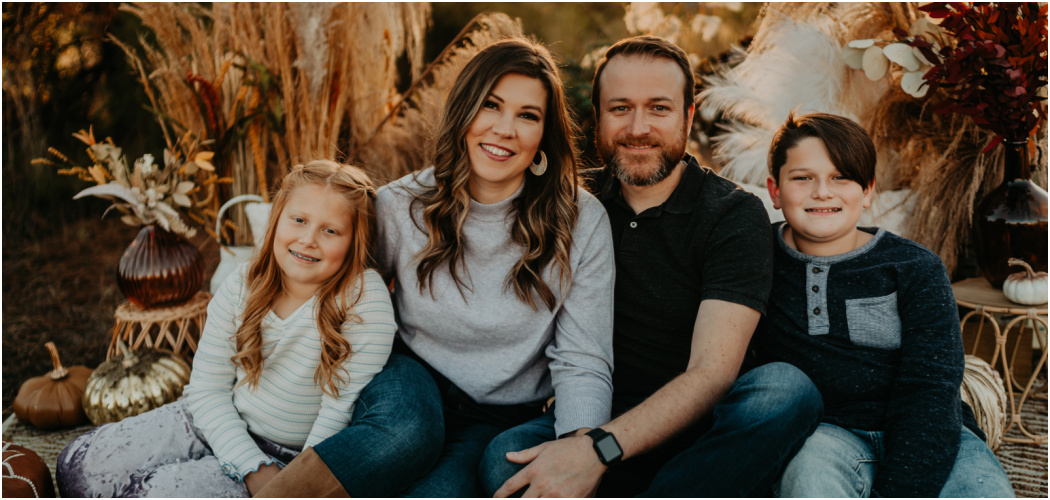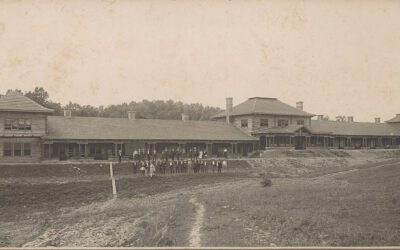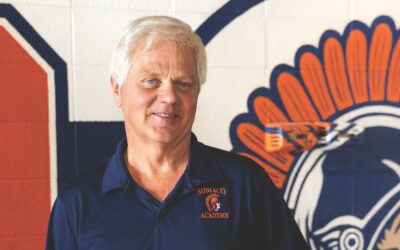The CALL helps fill the need for foster families
A fourteen-year-old girl who’d never had a Christmas tree.
It’s one of Kristan Williams’ many stories about being a foster parent. “It was November, and I never put our tree up early, but when she told me she’d never once had a Christmas tree, I ordered one right then. Two days later, we got it up,” Kristan says. “I didn’t want to wait, because I didn’t know how long she’d be with us, and I was determined that child would have her first Christmas tree. She loved it.”
Another Christmas miracle: a set of siblings she and husband James fostered in their Greenwood home informed them Santa never visited them, though he left presents for all their friends. “She told me, ‘The one year Santa came, all he brought me was coal,’” Kristan says, her voice filling with emotion. “I’m telling you, that Christmas, my church ‘adopted’ these kids to give them presents. It’s not about the gifts, but my goodness these kids had such an awesome Christmas. They think it’s something they’ve done that made Santa skip them, and we got to show them that it’s not.”
Deep Local Needs
Fostering children is a year-round, urgent need, especially in Western Arkansas. Emily Treadaway is county coordinator for The CALL in Crawford & Sebastian Counties. The organization recruits, trains, facilitates, and supports foster families to provide temporary homes to children who the state deems can’t stay in their homes until their parents stabilize. “We stay at around five hundred to six hundred kids in care in Crawford and Sebastian counties together. That was the highest in the state until the pandemic,” Emily says, explaining that only Pulaski County currently has more kids in need of homes. Other counties have as few as fifty children in foster care.
Yet, Crawford and Sebastian counties only have about one hundred foster families altogether. The homes average about two children each, meaning sixty percent of local kids get moved out of their county. The moves introduce more upheaval, as kids enter new school systems and move away from their friends. Emily says The CALL is hoping to recruit about seventy more foster families to meet the local demand and keep the kids closer to home.
The Call
About five years ago, Kristan, a mom of four girls, felt the call to be a foster parent after witnessing the experience of a church friend who was fostering children.
She and her husband James prayed about it. They’d years before considered fostering, but hesitated to commit, thinking it would be too hard to say goodbye to children they had bonded with when they returned home.
“It’s something that was put on our hearts,” Kristan says. “This time, we jumped right in and started the process.”
Streamlining Certification
That process was aided by The CALL. The nonprofit has one of the only partnerships of its kind in the nation between a state agency coordinating foster care and a faith-based organization. “We don’t approve homes or place the children — that’s all DHS,” Emily explains, referencing the Arkansas Department of Human Services, which manages the program. “We are simply here to help DHS find homes and get them open and support them.”
Part of The CALL’s role is to streamline the approval process, which can take six months or longer, to get a foster home ready to accept children. The CALL’s emphasis is on finding homes for the harder-to-place children, such as kids over six years old (she says many people want babies, but there are two hundred children in care age thirteen or older), sibling groups that want to stay together and children with medical or special needs. The organization does work with people looking to adopt from foster care, Emily says, but primarily seeks to find foster homes that will serve the ongoing and urgent need for temporary safe havens for the children.
The state requires that foster and foster-to-adopt parents receive thirty hours of special training. The DHS training takes place three hours, one night a week, for ten weeks in a row. The CALL offers the same thirty-hour training, but condenses it into two sequential weekends, which families often find easier to arrange. Additionally, the organization coordinates kids’ supervised visits with their families, offers respite care (some families opt to be respite homes for up to two weeks when foster parents need a break) and provides emotional and practical support for foster families. The CALL also provides helpful things like diapers, cleaning supplies, car seats, beds and cribs for the foster homes, even frozen family dinners. Kristan is a nurse, so she says their family gets matched with a lot of medically fragile children; when one needed weekly trips to Arkansas Children’s Hospital in Little Rock, The CALL provided gas cards.
Emily says there are “several pages of requirements,” but in general, foster applicants must be able to provide fifty square feet of bedroom space per child and afford their care even without the small stipend the state provides for each child’s basic expenses. Homes can be owned or rented, foster parents single or married, with kids of their own or none. Upper age limits have been waived because of need, so seniors over sixty-five can now be approved as fosters, but the foster parents must be at least fifteen years older than the foster child.
Adaptive, Sometimes Adoptive, Hearts
Every foster family is different, as is every child. The families control when they can accept new kids, choosing what’s best for their family and when.
Daniel Skipper describes himself as a “former foster parent” and supporter of The CALL. He and his wife Kristin had fostered a seven-month-old girl at their Van Buren home for just under a year before she returned to her parents, then they fostered a boy her same age, Elijah, whom they adopted in 2019. When Kristin gave birth to their fourth child later that year, they opted to cease fostering. “We needed to step away and close our home; four kids including the newborn was all we could handle,” he explains, adding they may eventually reopen (“open” and “close” are terms used to indicate whether a home is accepting foster kids) once their four become “a little more self-sufficient.”
In contrast, in four-and-a-half years of fostering, the Williams have had about thirty-five children stay with them, some for days, some for more than two years. Despite her original fears, Kristan says she now understands that “letting them go” is exactly what they need. “It’s not about, ‘Oh that’s going to be so hard on me,’ because I don’t do this for me,” she explains. “We’re doing this for the kids. We love these kids like they’re our own. But your heart adapts.”
She and James did end up adopting the first child they fostered, a son who now has four big sisters.
Daniel says that though it was emotionally hard for the whole family to send their foster daughter back to her parents, that was always the goal. But perspective helps. “My wife and I talked about how whatever we’re investing in this little girl at a year old — affection, stability — that’s something she was not getting before.” Reading about child psychology and development convinced him how important those things are for young children. “We hope that whatever impact we made on her in eleven months will carry on way beyond the heartache we had,” he says. “The long-term benefits to the child exceed however much it hurts to let her go.”
He says they were drawn to foster care initially when they were living in Oklahoma after they discovered their daughter’s preschool BFF was a foster child. “I was like, yes, we will take that little child — does she need a home? She does not ‘fit’ in our family, she is not the same color, she does not ‘match,’ but we would love to have her,” Daniel says. The little girl already had great foster parents, but it started the Skippers on their journey.
“We were actually going through the process of being approved for foster care in Oklahoma when we moved here, so we had to start the process all over again,” he says. “Luckily, we came through The CALL.” The organization helped shorten their Arkansas certification by several months.
Not Easy, But Worth It
Emily and her husband, who have two young daughters, served as a provisional foster family for her nephews and nieces for a span, and later had a foster child in their home about a year. “I know how hard it is,” Emily says. “I tell people, ‘It’s not my job to talk you into this. I’m not trying to convince you or guilt you into it. I’m simply providing the information about the path you can take if you choose to.”
While the thirty-hour training covers as much as it can, she says it can never cover everything. “One thing we talk about in training is even if you have been a parent, however you’ve parented your children, that’s not necessarily going to help you,” Emily says. “They have different needs, and sometimes only other foster parents can understand what you’re going through. … We provide a lot of support.”
Daniel says that while some children come with emotional trauma and behavioral problems, foster parents must remember it’s not the child’s fault. “I think any child that does not have structure is going to have some issues,” he says. “It’s not that they’re bad kids, they’re just adjusting. That pulls my heartstrings, the fact that these kids didn’t do anything wrong to deserve being pulled out of their homes. They don’t always know that.”
Not everyone is suitable or interested in being a foster parent, but The CALL needs volunteers in many roles, and the nonprofit depends on donors to sustain operations. It also works with churches to host supportive events like Foster Parent Nights Out and Drive-Thru Dinners. And one other vital thing.
“We also of course need prayers, because we’re faith-based and we know prayer works,” Emily says, adding that lately they’ve been asking local churches specifically to pray The CALL finds those seventy new foster homes.
“One thing we say is, we’re not all called to foster care, but we’re all called to do something,” she says. “If you’re reading this and it tugs at your heartstrings, let me know, and I will find a place for you to help these kids. There’s plenty of work to go around.”
The CALL
5521 Ellsworth Road, Fort Smith, Arkansas
479.353.0767
thecallinarkansas.org




